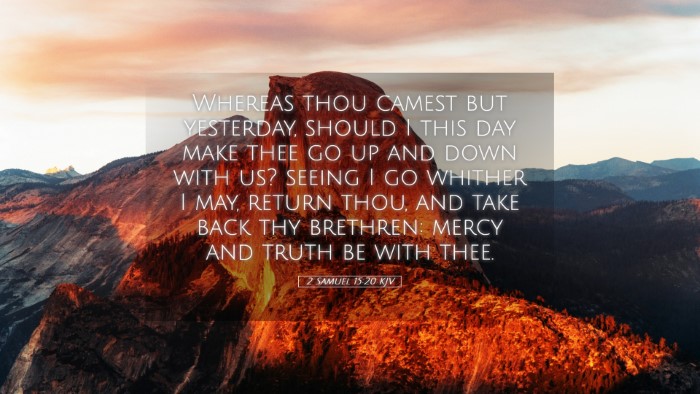2 Samuel 15:20 Commentary
Verse Context: 2 Samuel 15:20 states, "You came only yesterday, and shall I today make you wander about with us, since I go where I must go? If you return to your place and die, I will be more than sorry. But I will not go." This verse occurs during the time when Absalom's rebellion was gaining momentum, and David was fleeing Jerusalem. This moment reflects the tension and emotional distress that accompanies David's leadership journey.
Introduction
The events surrounding 2 Samuel 15 illustrate a critical juncture in King David's life, marked by turmoil within his own family and the nation. This commentary synthesizes insights from notable public domain commentaries, offering a rich exploration of the implications of this verse.
Exegesis of 2 Samuel 15:20
In this passage, we find David communicating directly to Ittai the Gittite, who has joined him in flight. David's reluctance to allow Ittai to continue with him reflects both his awareness of danger and his sensitivity to the risks involved. David's dialogue showcases his pastoral concern for those around him.
Commentary Insights
-
Matthew Henry:
Henry emphasizes that David's statement reveals his noble character as a leader who prioritizes the welfare of his followers. By encouraging Ittai to return, David demonstrates a selfless attitude, understanding that the coming troubles will inevitably affect the lives of those who accompany him.
-
Albert Barnes:
Barnes focuses on the dynamics of loyalty and companionship in times of crisis. He notes that David acknowledges the recent arrival of Ittai, highlighting the commitment made in joining David at a time of peril, yet he understands the gravity of the circumstances that might deter a loyal follower from proceeding into danger.
-
Adam Clarke:
Clarke provides a linguistic analysis, noting the implications of David’s words in the original Hebrew. He interprets "go where I must go" as indicative of David’s unpredictable path, emphasizing the nature of leadership during adversity and the necessity for wise counsel in navigating tumultuous times.
Thematic Analysis
The themes that emerge from this brief verse are profound. They encompass loyalty, the weight of leadership, and the human experience of mourning and loss amidst turmoil.
Loyalty in Crisis
The situation exemplifies a deep understanding of loyalty and the challenges that arise when allegiances are tested. David respects Ittai’s autonomy, allowing him the choice to return. This act speaks volumes about David's relational leadership style, which respects the agency and well-being of others.
Challenges of Leadership
David’s leadership is fraught with challenges, especially during moments of personal and national crisis. His concern for Ittai also signifies the emotional toll that leadership exacts. It invites pastors and leaders to consider their own responsibilities toward those who follow them, particularly in trying times.
Human Emotions amidst Adversity
David’s conversation with Ittai invites reflection on human emotions in adversity: sorrow, frustration, and uncertainty. These are pivotal experiences that shape the leaders and followers alike in their faith journeys.
Practical Applications
The lessons within 2 Samuel 15:20 resonate with modern-day applications for church leadership, counseling, and discipleship.
-
Empathizing with Followers:
Pastors and leaders are encouraged to empathize with their congregants, recognizing their struggles and decisions during challenging seasons.
-
Promoting Autonomy:
Encourage followers to make decisions based on their understanding and circumstances, showing respect for their journeys.
-
Modeling Resilience:
Provide examples of resilience and faithful commitment to God amidst crises, thereby teaching congregants how to navigate their own difficulties.
Conclusion
2 Samuel 15:20 serves as a poignant reminder of the complexities of leadership, loyalty, and the human condition in the face of adversity. By studying this verse, leaders can glean wisdom from David's approach that is applicable in both spiritual and practical contexts. Insights from established commentators emphasize the relevance of these themes, encouraging deeper spiritual reflection and growth among pastors, students, and scholars alike.


